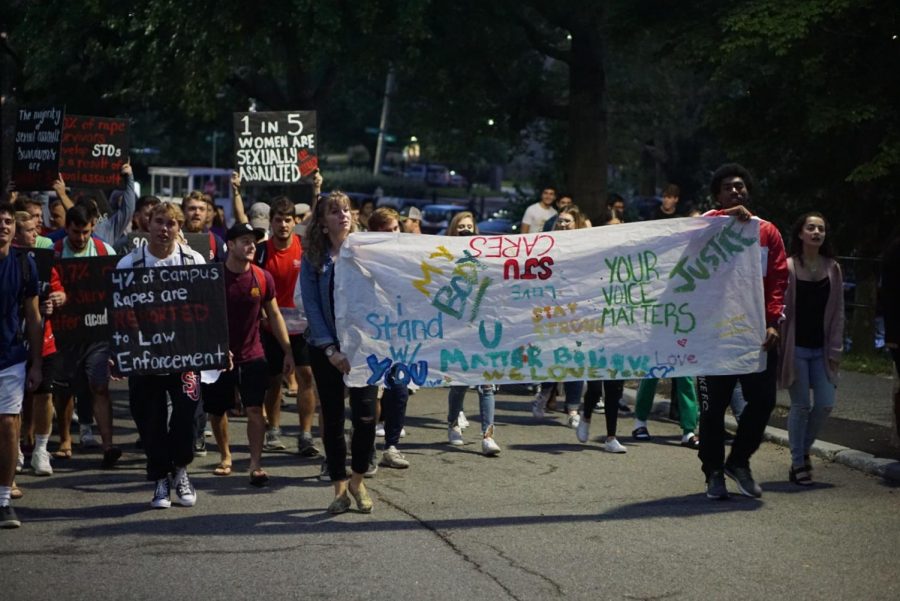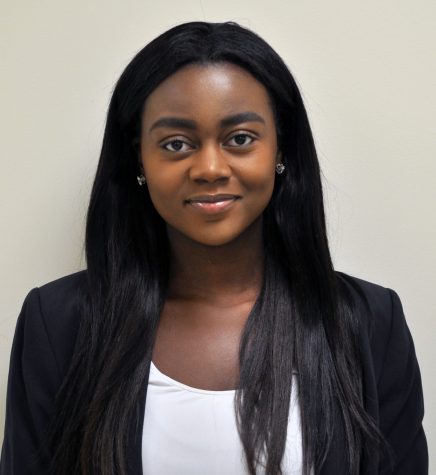Almost 300 students gathered in front of Donovan Hall on Tuesday night to raise awareness about sexual assault on college campuses.
Take Back the Night is part of a national campaign known as “It’s on Us”, this year’s theme was “reclaiming what’s yours.”
This year’s march was especially momentous with the #MeToo movement and the judiciary committee’s nomination of Brett Kavanaugh being major talking points.
Representatives from Greek organizations on campus led attendees in a pledge to take accountability of actions that contribute to the prevalence of instances on campus.
“I think here and now, this is the moment which we’re supposed to like be held accountable for our actions and take responsibility for the things that we do,” Aitana Ruilova-Castro, President of Delta Phi Epsilon said. “The Brett Kavanaughs make the laws for the Brock Turners, who end up becoming like Brett Kavanaugh.”
When referring to Brock Turner, a Stanford University student who received a lenient sentence for a sexual assault case, Ruilova-Castro said that in college, it’s important that students understand the long-term consequences of their actions.
“We sometimes think that we’re doing the right thing and we’re not, so doing something like this, especially as a community that is associated with sexual assault, is a way of opening our eyes and the eyes of the people and orgs around us and accepting that we have a part to play in this,” she said. “We have to try to do our best to keep these things from happening.”
Students chanted “stop the violence, break the silence” as they marched from the Residence Village to the D’Angelo Center. Hannah Artiles-Stravers, director of Sexual violence Outreach, Awareness and Response Initiatives (SOAR) said that this was the largest turnout that they’ve ever had.
“The importance of the timing was really powerful, to let folks know that we believe them,” she said. “If you’re a survivor whose been hearing women questioned in the news, and you come to an event and we say we support you, we believe you, that’s really our message tonight. My hope is that survivors who maybe have never told anyone or maybe feel alone know that they’re not alone and feel empowered to get support.”
Last week, actor Bill Cosby, once known as America’s dad, was sentenced to three-10 years in prison for sexual assault. This week, the FBI is investigating allegations of assault against Supreme Court nominee Brett Kavanaugh. Artiles-Stravers calls this: “a tough week for survivors.”
Cooper Miqueli, president of Pi Lambda Phi fraternity, echoed the same support for survivors.
“It really is terrible what’s going on and the more we’re aware of it, the more we’re talking about it, the more people are conscious of it,” he said. “You know we’re seeing all these stories that came out, it’s good that we’re building a society where people feel comfortable enough to speak up. It shows the way our country is moving so that people who are victims feel more comfortable to come forward and call people out. We are taking steps as a community to try to better each other.”
Miqueli said constant reminders such as refrigerator stickers and an “It’s on Us” t-shirt remind him to advocate for sexual assault survivors and to educate those around him.
“If everyone’s aware, everyone will be accountable, of not only themselves, but each other.”
Caroline O’Brien, Theta Phi Alpha sorority member, was happy to see so much love in one room.
“In the age of patriarchy and male dominance, the volume of our voices has never been more crucial,” she said. “It is more than a civic duty, but our duty as humans is to listen, believe and share with one another.”
Junior Nick Madonna used the event to better understand survivors and how he can be a part of the change.
“This day in age, it’s really important to understand from a woman’s perspective what sexual assault is, and not to be afraid to come out and say what happened if you were assaulted.”
Moving forward, Artiles-Stravers said that SOAR is working to change the culture on campus for students.
“We want people to know we expect you to speak up, we expect you to look out for each other, to make change on the campus,” she said. We also try to create a safe space for survivors to tell us what they’ve experienced.”
















